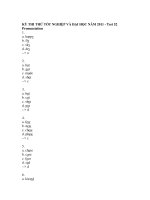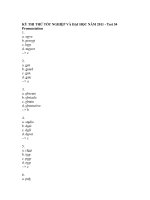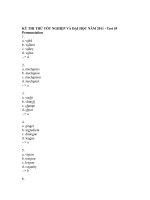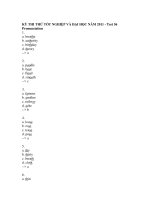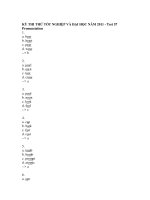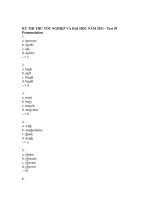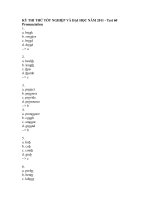KỲ THI THỬ TỐT NGHIỆP VÀ ĐẠI HỌC NĂM 2011 - TEST 5 ppsx
Bạn đang xem bản rút gọn của tài liệu. Xem và tải ngay bản đầy đủ của tài liệu tại đây (70.33 KB, 8 trang )
KỲ THI THỬ TỐT NGHIỆP VÀ ĐẠI HỌC NĂM 2011 - TEST 5
I. Pronunciation
1. a. cure b. picture c. lecture d. furniture
a
2. a. plow b. how c. cow d. row
d
3. a. enough b. cough c. although d. rough
c
4. a. son b. only c. lone d. bone
a
5. a. rate b. late c. private d. date
c
6. a. chair b. cheap c. chemist d. child
c
7. a. look b. book c. soon d. good
c
II. Find the mistake:
8. We can prevent flood by preservation the forests.
a. can prevent
b. by
c. preservation
d. the forests
> c
9. Does the grass need be cut?
a. Does
b. the
c. need
d. be cut
> d
10. Jane said she is 18 years the following week.
a. said
b. is
c. years
d. the
> b
III. Grammar and Vocabulary
11. Tom has made a bad mistake at work, but his boss doesn’t fire him. He’s
lucky a second chance.
a. having given
b. having been given
c. to have given
d. to have been given
>d
12. This picture long before he went to university.
a. had been taken
b. had taken
c. has been taken
d. has taken
a
13. Dr. Wilson is a brilliant and dedicated scientist who had expected to be
selected as the director of the institute. He was very upset not the
position.
a. having offered
b. having been offered
c. to have offered
d. to have been offered
>d
14. If you are a , you have to work hard.
a. scientist
b. science
c. scientific
d. scientism
a
15. By the time their babies arrive, the Johnsons hope painting
and decorating the new nursery.
a. having finished
b. having been finished
c. to have finished
d. to have been finished
>c
16. Nam with his parents at the moment though he
his own flat.
a. is staying / had
b. is staying / has had
c. is staying / has
d. was staying / has
c
17. We would like to the president’s reception, but we weren’t.
a. having invited
b. having been invited
c. to have invited
d. to have been invited
>d
18. If you what Nam is doing, you very
surprised.
a. had known / would be
b. knew / would be
c. knew / would have been
d. knew / will be
b
19. George mentioned in an accident as a child, but he never
told us the details.
a. having injured
b. having been injured
c. to have injured
d. to have been injured
>b
20. Her was so great that she couldn't drive her car.
a. anxiety
b. anxious
c. anxiously
d. anxiousty
a
21. The Smiths wanted to give their son every advantage. However, they
now regret him by providing too many material possessions.
a. having spoiled
b. having been spoiled
c. to have spoiled
d. to have been spoiled
> a
22. Instead of a new car, she'll have her old
one
a. to buy / repaired
b. buying / to repair
c. buying / be repaired
d. buying / repaired
d
23. The spy admitted some highly secret information to enemy
agents.
a. having given
b. having been given
c. to have given
d. to have been given
>a
24. I very happy if there a good film on
channel 9 last night.
a. would be / had been
b. would have been / would be
c. would have been / had been
d. had been / had been
c
25. My friend’s main for going abroad was his poor health.
a. need
b. reason
c. cause
d. desire
>b
26. She received a lot of from her friends.
a. encourage
b. encouragement
c. encouragements
d. encouraging
b
27. The examiner will test your to drive under normal conditions.
a. ability
b. advantage
c. wisdom
d. virtue
>a
28. It's the most story I've ever read.
a. boring
b. bore
c. bored
d. boringly
a
29. Over the past two years the of living has risen considerably.
a. rate
b. charge
c. cost
d. price
>c
30. It was a record that no one before.
a. has ever set
b. had ever set
c. has ever been set
d. had ever been set
b
31. It’s so long since I saw him that I almost failed to him.
a. receive
b. accept
c. recognize
d. approve
>c
32. He promised to come but he's very
a. unreliable
b. reliable
c. reliably
d. unreliably
a
33. The police must now the escaped convict in the surrounding
countries.
a. search
b. look after
c. look for
d. be in search of
>d
34. He isn't honest. He always gives advice.
a. useless
b. use
c. useful
d. usefulness
a
35. Newspapers should try to printing statements that they cannot
check.
a. refuse
b. neglect
c. deny
d. avoid
>d
36. She hopes she'll soon find a to the problem.
a. solution
b. solve
c. solutionist
d. solvation
a
37. In the 1960s, pop art …………… to discover artistic significance in the
commercial artifacts of the consumer culture.
a. seeking
b. to seek
c. has sought
d. sought
d
38. The four-storey house on that hill is still new.
a. be built
b. building
c. built
d. being building
c
39. Overexposure to the sun can produce ……………. some toxic
chemicals.
a. more than damage to the skin
b. more damage than to the skin
c. damage more than to the skin
d. more damage to the skin than
> d
40. In the old days, many poor and people had to live and
work in the workhouses.
a. home
b. homely
c. homeless
d. homelike
c
41. “Did you enjoy the show last night?” “Yes, but I wish I a
cold.”
a. hadn’t
b. didn’t have
c. hadn’t had
d. wouldn’t have
>c
42. Several nations are supplying countries
with new technology.
a. developed / developing
b. developing / developed
c. developed / develop
d. developing / development
a
43. It’s high time you to study seriously.
a. begin
b. began
c. did begin
d. would begin
>b
44. I the book you lent me for a week, but I
it yet.
a. have been reading / has not finished
b. had been reading / have not finished
c. have read / have not finished
d. have been reading / have not finished
d
45. I wish you longer.
a. will stay
b. can stay
c. could stay
d. stay
> c
46. Each athlete has to take part in the Olympic Games in the true spirit of
a. sportsman
b. sportsmanlike
c. sportsmanship
d. sports
c
47. “Why didn’t you invite me to go to the dance?” “Sorry, I wish I
you to go with us.”
a. could invite
b. invited
c. have invited
d. had invited
> d
48. How many cigarettes you today?
a. have / been smoked
b. have / been smoking
c. had / smoked
d. have / smoked
d
49. “Do you like your new job?” “Yes, but my employer insists that I
on time.”
a. was
b. am
c. be
d. have been
> c
50. She often uses her goods as as she can.
a. economic
b. economically
c. economical
d. economicly
b
